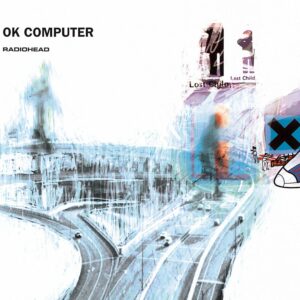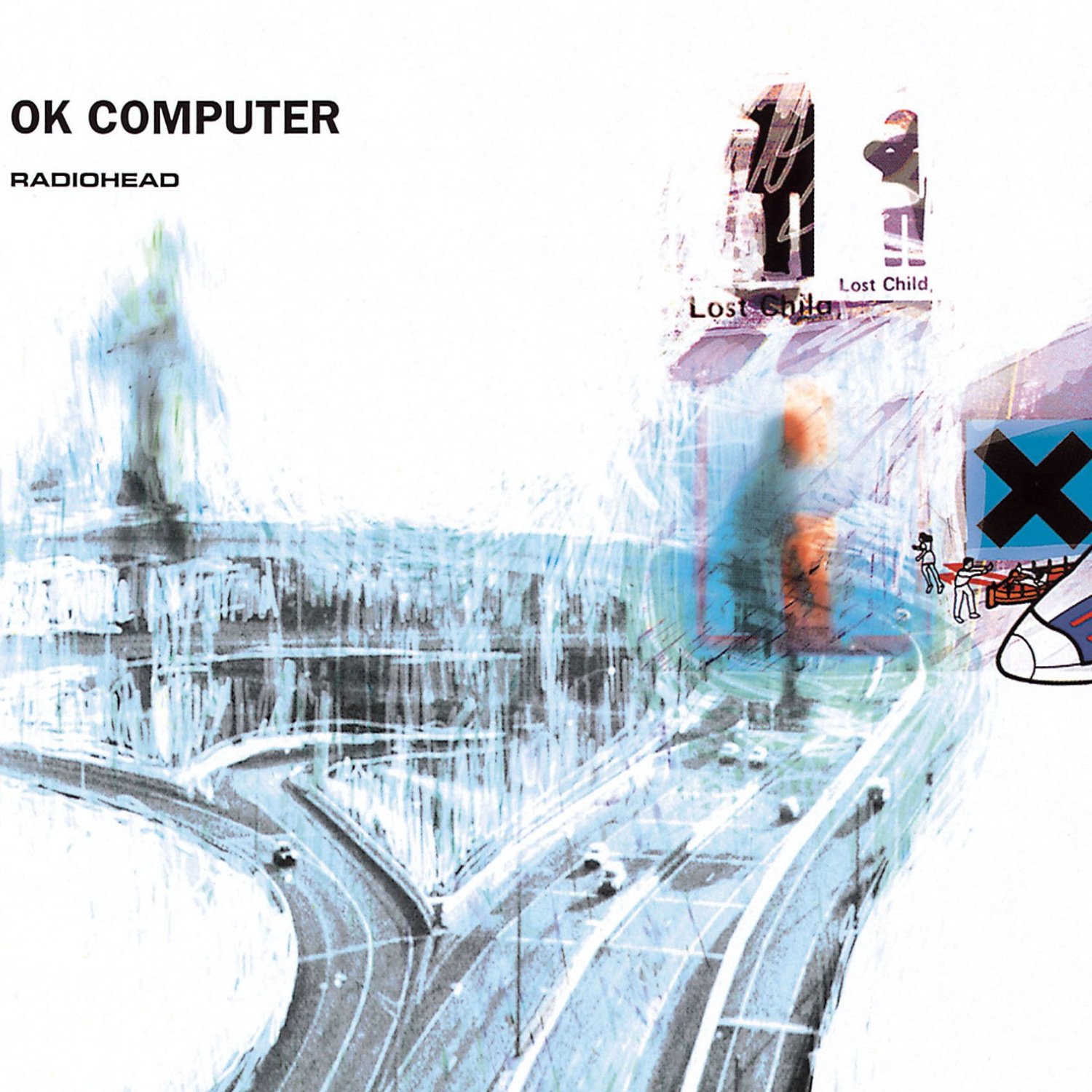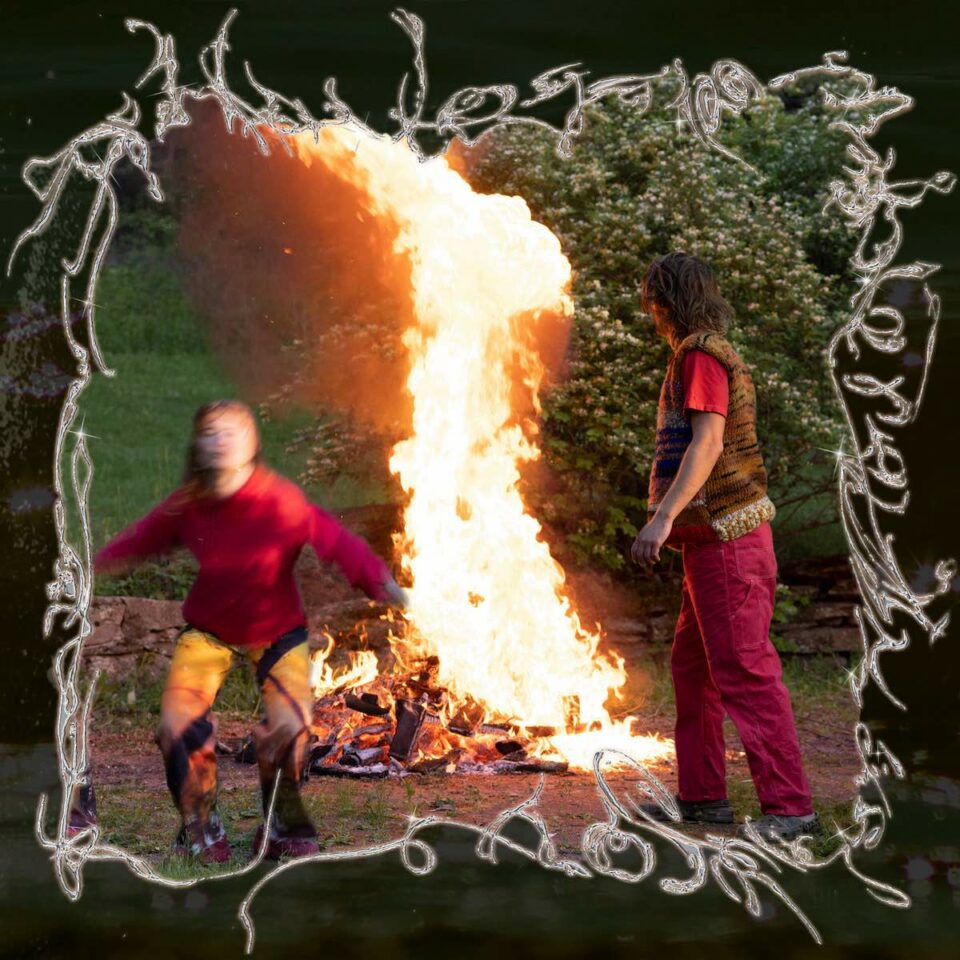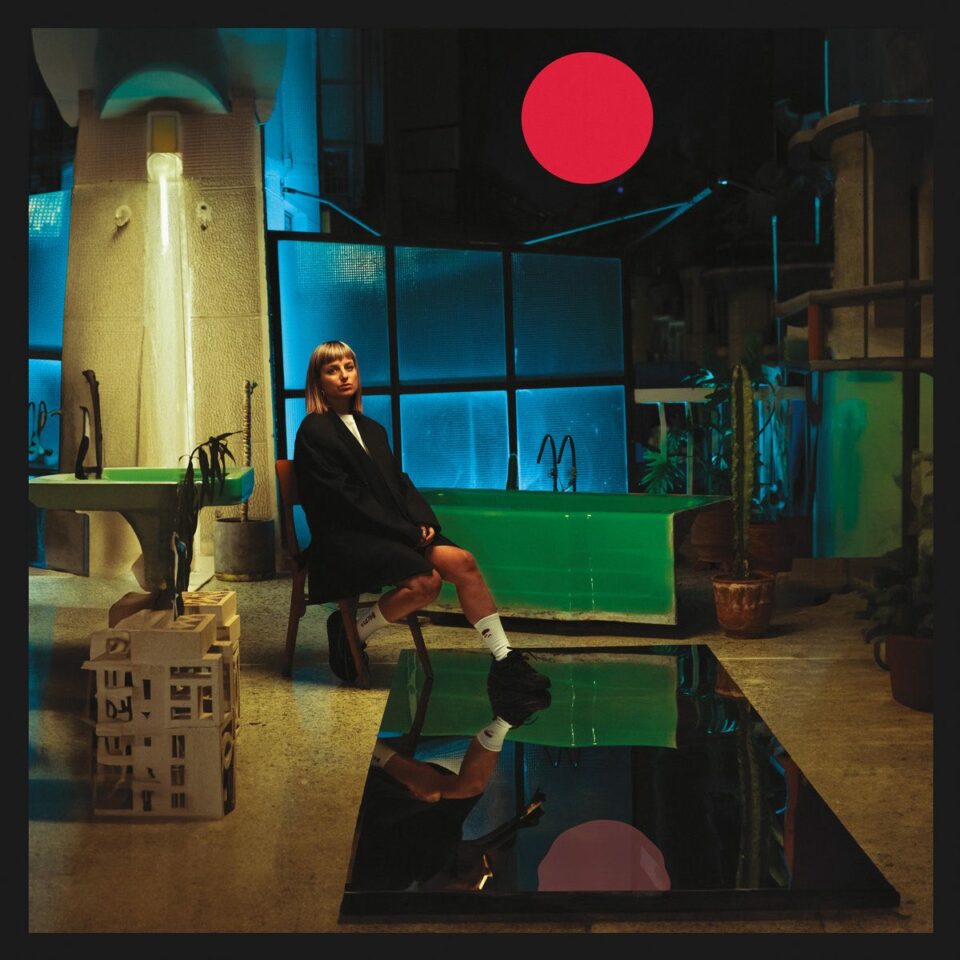Eighteen years ago, on May 21, 1997, Radiohead released their third album, OK Computer. At the time, the record heralded a significant change for both the band and the status quo of alternative music. Met with doubt from its label, Capitol, and hesitation from the audiences that had embraced the band’s 1993 debut Pablo Honey and 1995’s The Bends, the experimental OK Computer went on to gain critical acclaim, and continues to represent a singular moment for Radiohead’s career, as well as modern music, standing as one of the best albums ever made.
As it turns eighteen and enters maturation, publisher Alan Sartirana, editor-in-chief Pat McGuire, senior editor Breanna Murphy, associate editor Bailey Pennick, and editorial assistants Christian Koons and Nate Rogers discuss their personal relationships with the album and examine the legacy of OK Computer.
OK Computer
 1. “Airbag”
1. “Airbag”
2. “Paranoid Android”
3. “Subterranean Homesick Alien”
4. “Exit Music (For a Film)”
5. “Let Down”
6. “Karma Police”
7. “Fitter Happier”
8. “Electioneering”
9. “Climbing Up the Walls”
10. “No Surprises”
11. “Lucky”
12. “The Tourist”
Pat McGuire: I was a rising senior in high school, and [OK Computer came out] the day before my seventeeth birthday. I remember seeing the “Paranoid Android” video on MTV, and not really knowing what to think. I had been a fan of the singles from the first two records, being “Just,” “Creep,” maybe “Talk Show Host,” and then “Fake Plastic Trees” and “High and Dry.” I don’t even know if I had a copy of The Bends, but I definitely knew those songs pretty well. I remember buying OK Computer at Best Buy during the summer. For some reason, I always equate it with this rural farm where we used to go practice preseason soccer. It had a tobacco barn next to the soccer field, and I remember just blasting it out of our cars. And the whole soccer team was into it, collectively, even though it was kind of a weird record to be, like, full of testosterone and listening to. That’s the clear memory of the record as a moment of time.
Breanna Murphy: For me, the first time I heard this record was, embarrassingly, “Exit Music (For A Film),” which soundtracked the very end of Romeo + Juliet, and I really hate to admit it, but that’s how I got into Radiohead; “Talk Show Host” is in it, too, and that was the Radiohead song that I ended up really latching onto, though that’s not OK Computer. OK Computer is not in my top three Radiohead records, it never really has been. I have a weird off-kilter Radiohead list, I tend to like the ones that no one else does, or the least acclaimed ones; I don’t like Kid A, either.
Nate Rogers: What’s your top three?
Breanna: Hail to the Thief, The Bends, and then probably In Rainbows, in that order. But for me, OK Computer stands out as this huge piece of the ’90s, this thing that I wasn’t completely aware of at the time, being ten years old when it came out—this dialogue on technology and commercialism. So, I find my initial introduction to this album interesting; Radiohead being in this very corporate, pop culture film. The movie doesn’t really stand up to time, but the record definitely does.
Bailey Pennick: I’m also going to admit that “Romeo plus Juliet” was the first place I heard it. I heard the entire album in high school, definitely one of those situations like, “Oh, Radiohead, let’s all sit around and listen to this.” And I was just sitting there. I understand objectively why Radiohead is important, I just cannot get on board, personally. I also like In Rainbows best. I appreciate the details of OK Computer, but I still think it’s incredibly sleepy and pretty boring. Also, the Clickhole Oral History of Radiohead’s OK Computer made me think about it in a different way…when you think about it as an album trying to get a computer to play guitar.
Christian Koons: I was seven when OK Computer came out, so I didn’t hear it then. In 2001, 2002, a friend of mine was really into Kid A, and I wasn’t. Radiohead was too dark and emotional for me. I thought they were a Swedish techno band because of “Idioteque,” and I was pretty wary of them. I was eleven.
Bailey: Like Raadiöhed?
Christian: Yeah, totally. And my friend who loved them took pills for depression, so I was like, I can’t hang with this. Funnily enough, the first time I actually had a point of access for OK Computer was Stereogum’s tribute album in 2007. All these bands I was into at the time were covering songs, like Cold War Kids does “Electioneering.”
Bailey: Björk’s on it, too.
Christian: I was in high school at the time, sixteen or seventeen, and Vampire Weekend did “Exit Music,” David Bazan did “Let Down.” That was the first song I was into on the record, because I thought it was happy, but didn’t actually realize that it’s super sad. That’s how I got into it, but I never bought it or anything. This album was actually my first Radiohead record.
Nate: This was back when I used to buy all my CDs at Borders with gift cards. RIP, Borders. A lot of my cultural knowledge came from my aunt’s $20 gift cards for Hanukkah and my birthday, and I would pick random CDs that I figured I should know. Like OK Computer. But I think I started with Hail to the Thief, and didn’t get into it, that was 2003 so I was thirteen or fourteen. And I kind of forgot about Radiohead for a while, and then I remember my sister apologizing to me because she destroyed one of my CDs. And I was like, “What are you talking about?” and she handed me a destroyed OK Computer CD that her car had eaten; her car that eventually became my car where I probably got into this record, I think, around that time. It was one of those CDs where you knew it had skips on certain tracks, like the end of “Karma Police” would start skipping around the time that the distortion came in. When I listen to it now, it feels wrong. This is such a cliché, but that record totally changed my life. It still completely floors me every time I listen to it. Even though I don’t listen to it that much because it’s that compelling to me.
Alan Sartirana: When I first heard it, I was working at Geffen Records and I think I had to trade a friend of mine some Beck promo for it. When they put out OK Computer, instead of sending out advances, they sent out Walkmans with the album on a cassette that were glued shut so you couldn’t take it out. They were literally super-glued shut. I remember listening to that cassette so much; it probably sounds awful now, we wore it out. At first, I was disappointed because I was hoping for some sort of… I dunno, another Radiohead record that was maybe gonna be more commercial. I was expecting something more straightforward. And then, a week later, I thought it was the best record I’d ever heard.
Christian: I’m surprised at how much of an emotional toll it still takes, listening to it all the way through. It’s so fucking intense. Thom Yorke’s like… There’s desperation in his voice in every song. It explores such dark themes.
Pat: This was sort of the end of the era where you didn’t separate songs from the entire album. Going to college the next year, people had Napster and you could listen to individual tracks. I can’t separate any of the tracks from the whole album in my memory or even now. That makes it so great because if you just listen to a couple of songs here and there, with the exception of maybe “Karma Police,” they don’t fit to me. You can’t hear “Climbing Up the Walls” or “Electioneering” outside of the context of the whole album.
Breanna: I think Radiohead still make records to be consumed that way. Wasn’t there was a big kerfluffle when In Rainbows came out and the way you could buy it digitally? I feel like these records are supposed to be consumed like a book, chapter by chapter. With OK Computer, especially, you go through the whole thing. When you listen to “Karma Police,” the “hit single,” in context with the record, it’s different than when it’s standalone because you’ve already gone through all these other themes of the record. It doesn’t have the same feeling as it does when you just have it in a mix with a bunch of other random things.
Alan: It was their last record that was driven by guitars. Which is a huge deal. When you listen to “Paranoid Android,” you’re like, “What’s the fuck is going on? This thing’s awesome.” I think the first reaction to the album, honestly, was confusion. But then, as you start listening to it more and more…
Pat: Do you guys remember the videos at all?
Christian: I remember… I think it’s “No Surprises” with Thom Yorke submerged in the tank.
Pat: Yeah, the one shot filling up with water.
Christian: And that’s so emblematic of the record. It’s an image—his head, the tank filling up with water—that I just associate with Radiohead and the kind of present danger and general bummed-out-ness. But, also, you can’t take your eyes away.
Nate: And it transferred Radiohead into art-band realm. I didn’t even associate them with that when I bought the record. That was the whole push-back with the record, that’s the story, right? The thing that Clickhole are making fun of is that [Capitol] thought it wasn’t commercial and instead of a video of Thom Yorke and his pretty blond hair, it was Thom Yorke slowly getting drowned in a box. It was interesting decision on their part, I guess, that paid off.
Alan: I think ’97 was probably about the end of the music video era, but MTV was still about music videos. Radiohead did really non-traditional ones. That was the other thing that was rad about them—they made totally not-commercial music videos, which, at the time, were only made for commercial purposes. Really. They made an animated music video for “Paranoid Android,” they made that drowning video for “No Surprises,” and the “Karma Police” one is the guy running in front of the car. But it’s totally, if you look at the videos for OK Computer, they’re more cinematic. They made videos more as films or pieces of art versus just being something that you use to promote a song. I feel like on OK Computer, they were just like, “Fuck it, we’re gonna make what we wanna make,” which is how I feel about the record, too.
Pat: When did you see them live? I guess I didn’t see them until the Kid A tour.
Alan: I had seen them on the Bends tour, like at Slim’s [in San Francisco]…somewhere really small. And then I saw them at the Troubadour. I didn’t live in LA, but I remember seeing them at the Troubadour, they did a show around the OK Computer release, and that solidified the record for me. They could play that record and make it sound better than it actually sounded on the record, and we had been, “There’s no way they’re gonna be able to play this live.” It also proved, more than anybody, how absolutely necessary Jonny Greenwood is to the band. Amazing, because the first time you hear that record live, especially if you hear “Lucky,” you’re just like… that song is brutal live, it’s so good.
Breanna: I didn’t see them until In Rainbows. I saw them when Liars opened for them.
Bailey: I saw them at the first Outside Lands.
Christian: With In Rainbows, I remember at the time, a lot of people were comparing In Rainbows to OK Computer because you can argue it’s the first return to kind of proper band format after the run of Kid A, Amnesiac… Hail to the Thief was pretty electronic-leaning. I remember there was something where like you play OK Computer and In Rainbows in alternating tracks and it was supposed to go together. They’re supposed to be thematically coherent or something. The last song they played when I saw them for In Rainbows was “Paranoid Android,” which no one thought they would.
Breanna: Does the record stand up for you, in relation to the rest of Radiohead’s catalog and music today?
Pat: The best way to sum it up is that it kind of becomes the thing where the whole is greater than the sum of its parts. I don’t remember the last time I thought, “Oh, maybe I’ll just throw it on.” But I don’t really do that for Radiohead and maybe it’s because I listened to it so much in real-time. It’s one a hundred records that you have every inch of it memorized forever.
Nate: “Electioneering,” to this day, is my favorite Radiohead song. To me, it’s the song that defines Jonny Greenwood. Since then, I feel like he’s been fading into the background of the band. It’s a side of the band that was a relic from The Bends era that completely got lost going forward. And now you’re lucky to hear a single guitar line. King of Limbs didn’t have any at all, really.
Christian: Yeah, he’s an incredible guitarist, but I think of Jonny Greenwood as the brain and Thom Yorke is the heart.
Alan: I still think it’s one of their best records, hands down. It redefined what “alternative bands” were because people… That’s the thing, that’s why I think for the first week I was disappointed because it’s not really an alternative record, it’s just really weird. But then, as you get deeper into it, you listen to all the songs. It really is one of those last records that you listened to as an album all the way through.
Bailey: The more electronic, the more sparse and the stranger they’ve gotten, I feel there’s more people who just listen to “Radiohead” versus “OK Computer”—it’s all or nothing. “Radiohead rocks because they’re a cool band.” It seems like the stranger they’ve gotten, the more mainstream people just want to lump it all together.
Breanna: I like that you think they’ve gotten stranger, because I think OK Computer is the strangest record. There’s a lot of commentary on politics that I just can’t grasp—maybe because I wasn’t cognizant at the time of what was going on. It’s really out there for me, and that contributes to why I find OK Computer to be such an outlier. I think it’s a really weird record.
Christian: OK Computer is a testament to what success does to a band. And what the difference is of a band that continues to be relevant. Capitol was like, “OK, make The Bends Part Two, and you’ll sell like four million records. You guys are the shit right now. Just do that again.” And they completely pushed against that.
Pat: And people are still waiting for that record. Every time there’s a new record, people are like, “Oh, maybe this is the guitar record again.”
Nate: I’m still waiting for it!
Pat: If you knew the first thing about Radiohead, you’d know that that’s never going to happen.
Nate: I think it will because, at this point, everyone’s given up on it and it would be the weirdest thing for them to do, to finally deliver it after more than ten years, even if you count Hail to the Thief as a guitar record, which it isn’t.
Pat: I don’t think they’re doing weird for weird’s sake or something different. I think they’re really sincere artists that have no interest in reliving it. They certainly don’t need the fucking money or the acclaim or the status. I would be really shocked and not even that interested if they did The Bends Part Two. Would that record make any sense?
I’ve been trying to think of another band from that era that has been around and important this long that has made as many landmark moves as Radiohead has, you know? In Rainbows kind of changed everything, whether you admit it or not. Kid A and Amnesiac kind of changed everything again. And OK Computer changed everything first. FL









